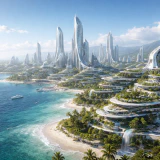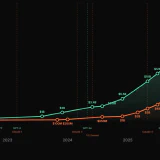The Limits of the Network State
I examine the practical limits of the Network State concept and its path to sovereignty as it clashes with the governments’ monopolies.

The Network State is a concept popularized by the entrepreneur and investor Balaji Srinivasan. These network states begin as highly-aligned online communities and graduate to diplomatic recognition by existing countries, rather than seizing territory by force.
You can read in his own words:
A key concept is to go cloud first, land last — but not land never — by starting with an online community and then materializing it into the physical world.
I can understand the idea behind these words. The countries and states we have aren’t always great. They are often silly, short-sighted and outright dangerous. They hold their population hostage as politicians ride the memes to gain more power and execute things without understanding the unintented consequences. Unfortunately, I doubt we can go beyond them, even though I’d love to share the view.
Balaji’s ideas are very similar to the cyberpunk visions of the late 20th century, specifically the concepts explored in Neal Stephenson’s Snow Crash and Diamond Age. Both show post–nation-state governance models where corporations, cultural groups, or clans function as sovereign entities with their own laws, police, and territories. Phyles in Diamond Age are large, voluntary, and culturally aligned networks of people spread across the globe.
I can’t see a path for Balaji’s network states to become something more than a club or an online forum and gain sovereignty. Fukuyama’s End of History is an extremely misunderstood book: it doesn’t say the world won’t change; it implies that we will never see novel state concepts beyond liberal democracies (although countries can break down to authoritarianism again).
Sovereign states have three key monopolies they will never give up or share: identity, taxation, and the use of force. We will dive into each aspect separately, but let’s start with sovereignty itself.
There are 193 member states in the United Nations. The bar to be recognized as a sovereign state is exceptionally high. The advantages are numerous and there are few things worse than being born in an unrecognized state.
According to Balaji, a startup society with sufficient scale should eventually be able to negotiate for diplomatic recognition from at least one pre-existing government, and from there, gradually increase sovereignty, slowly becoming a true network state.
A few countries are recognized by only a small group of UN members: Abkhazia, South Ossetia, Northern Cyprus, and the Sahrawi Arab Democratic Republic. And these are some of the most chaotic, dangerous and poor societies in the world. Their recognition is primarily a political act, usually conducted by one or a few major countries in the region who have their own interest at heart (Russia for the first two, Turkey for Northern Cyprus, etc). Getting recognition by any state is extremely hard, but being accepted by a failed state or a poor Pacific Island nation wouldn’t help.
Truly sovereign states simply don’t want to lose the exclusivity of their status and unique capabilities.
Identity
Srinivasan envisions one’s citizenship for the network states will be established through cryptographic identifiers (for example, Ethereum Name Service or World Chain) rather than birth certificates or passports. But this is nothing more than relying on a library card.
If you can’t use the document to enter another state, it’s not an identity. Going through the border control requires a passport, and not just a piece of paper with a biometric chip, but a passport recognized by other countries.
The only non-governments that have the capability to issue internationally recognized passports are the Sovereign Military Order of Malta and the Vatican. As you can imagine, they do this very sparingly. The Vatican is a micro-state whose passports are issued to clergy, officials, and diplomats of the Holy See. The Maltese Order is actually recognized as a sovereign subject of international law for historical reasons. It has diplomatic relations with over 100 countries, making its passports valid for official travel in many places. However, these passports are not available to the general public and are strictly limited to official use. No other non-governmental organizations or entities have internationally recognized passports.
You can get things like Palau Digital Residency, which a blockchain-based digital identity program offered by the Republic of Palau, but you can enter zero countries with this. That’s why it’s just a “library card”.
Certain countries issue so-called alien passports to refugees. A Belarusian citizen who escaped persecution can obtain one if they live in the Netherlands. However, according to the law, they will still be Belarusian citizens and will not get any additional rights (e.g., visa-free travel to the US).
Governments have a monopoly on identity.
Taxation
Balaji believes that since the crypto-based economy is inherently borderless and can operate outside legacy banking systems, traditional tax authorities will have less visibility and control over network state commerce.
In Stephenson’s books, the invention of crypto currencies led to the collapse of centralized states, which could no longer collect taxes. We have crypto currency, and the most capable tax entities know what to do with it. The US treats crypto as property, taxing gains and enforcing strict reporting rules. IRS enforcement is increasing, with mandatory reporting and penalties for non-compliance: from 2025, brokers must report digital asset sales to the IRS.
Balaji even foresees that network states will effectively arbitrate between jurisdictions to minimize burdens and maximize freedom for their citizens. Since a network state’s people are distributed across many countries, the community can choose to establish physical hubs in places with favorable laws and low taxes. Moreover, the network state is supposed to be funded by the members, who might pool funds to buy land or build communal infrastructure.
Since the governments have sovereignty, they are not going to relieve the network state of taxes. Anything you want to collect or raise has to come on top of the government taxes. The only countries willing to accommodate such daring requests are likely failed states.
And this is where we meet the final issue.
Use of force
Max Weber, a German sociologist, was the first to define the state as the only human community that claims the monopoly of the legitimate use of physical force within a given territory.
In the early stages, network states are supposed to lean on existing states for physical security. Srinivasan is candid that a startup society won’t be handling violent crime or defense immediately:
If governance is limited to the digital realm… how does a startup society deal with physical criminals? The short answer is that for a long time, it doesn’t – it leaves that to the surrounding legacy society.
An early network state has no physical coercive power, including an army or police force. Which is why being co-located with a potentially poor failed state is quite dangerous. Either you will suffer from organized crime, or sooner or later, they will try to take over the network state. At the same time, capable countries, whether it’s the United States or Singapore, won’t tolerate shedding sovereignty.
Of course, you might want to go beyond existing states and their land simply. Create new land.
Land becomes elastic. As Will Rogers once said, “buy land, they ain’t making any more of it.” Or are they? Seasteaders and the artificial islands built in Dubai show that land supply is perhaps more elastic than we think. We also know you can build cruise ships. So it’s possible that we could start reopening the frontier physically as well, not just digitally.
Dubai isn’t a great example. Palm Jumeirah and The World Islands are famous artificial land projects that are only possible with infinite oil money and for astonishment. Many countries dredge sand to raise their shores and protect them against erosion. And some (like China) indeed create artificial islands with the sole purpose of using them to claim sovereignty over a larger sea territory.
Countries can claim up to 12 nautical miles of territorial sea and 200 nautical miles of Exclusive Economic Zone from their land, including islands. China has built and expanded artificial islands to assert its “nine-dash line” claim, which covers most of the South China Sea.
If you want to create an island nobody can claim, you will probably have to do this in the Pacific Ocean.




